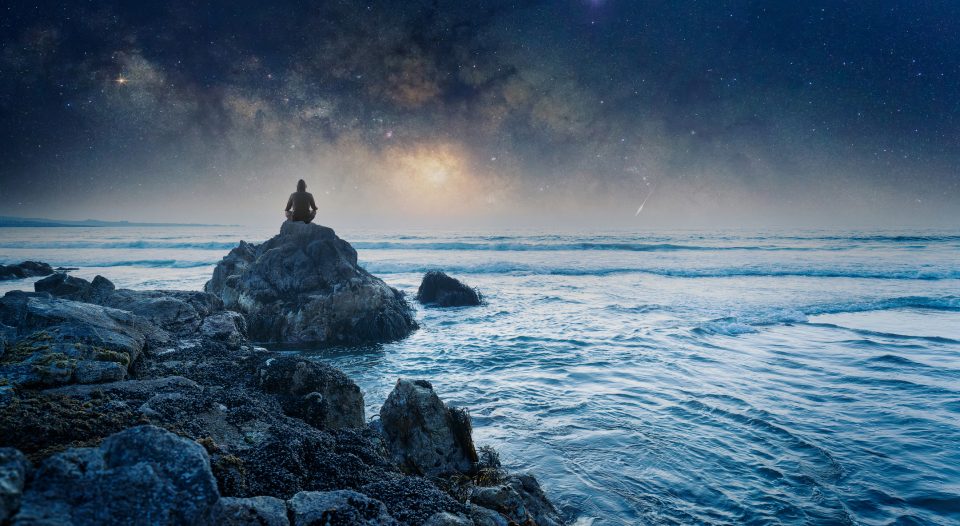Well, the sky always seemed like another ocean to me, you know? Like we live between two incredible oceans, and we’ll never get to the bottom of either of them. —Brian Doyle
From mankind’s beginnings, we’ve looked up at the stars and down into the sea with wonder. Nowadays, we can do much more than merely wonder. We live in a time when technology has advanced human exploration of the ocean and sky far beyond what was possible with the sailing vessels of the ancient Egyptians and Greeks and Galileo’s telescope. On my laptop I can find vivid images of bizarre-looking creatures living on the ocean floor, courtesy of the National Oceanic and Atmospheric Association. A calendar in my kitchen features crystal-clear photographs of galaxies many light-years away, taken by the phenomenal James Webb Space Telescope.
Much of what I don’t know, I can discover in a second, thanks to Google and artificial intelligence. In the time it takes to find the song list of Taylor Swift’s Life of a Showgirl album, I can read about (or watch on YouTube) the breakthroughs of the best modern-day scientists and scholars. It’s easy to believe I’m up to date on baby black holes and on how plate tectonics are reshaping the terrain 2 miles beneath the water’s surface.
Yet, I’m aware of how much I still don’t understand about the water and air around us. We earthlings chafe at our limitations and fantasize about what might be out there in the far reaches of existence. We’re impatient for definitive answers, because we’ve become so accustomed to facts at our fingertips. I recall an old 1940s song my mother used to sing to me with lyrics asking, “How deep is the ocean? How high is the sky?” Those are still our questions today.
Brian Doyle, the late Catholic essayist and poet, is one of my favorite writers. His faith informed his work, which is deeply insightful and often very funny. Doyle’s image of us humans as the relatively clueless filling in a giant cosmic sandwich may be delightful, but it’s challenging too. God has given us incredible brains and a great capacity for wonder, and we are charged with using both to the best of our ability. If this is a sandwich, we’re not supposed to be baloney. It is right that we’ve been striving for more knowledge about the vastness all around us.
As I gaze up at the stars on a clear night, as I stand on the beach and look at the vast Atlantic before me, I try to just marvel at their beauty. And I’m trying to be content with the questions that remain.
It seems each generation reaches a point beyond which much of our existence remains a puzzIe. Even the Webb telescope has limits, as do the super-submersibles that plumb the ocean depths. Our children and grandchildren will take the mantle in their turn, and we’ll move forward once again. But I’ve come to believe there may well be no end point. We will be extinguished as a species at some (hopefully far distant) time and still not know it all—or even most of “it.”
Is it better to stop exploring altogether? To content ourselves with what we’ve learned thus far? Like runners in a marathon where the finish line never stops moving away, should we call it a race and be done?
No. I think our striving, the continual effort to gain wisdom, is a worthy end. If we stop comparing ourselves to God (“Someday we’ll know everything and be just like you know who”), we can find both purpose and joy in the pace of our progress.
The Old Testament writers imagined that humans were created to rule the world, that all other living things could and should be claimed by us. Adam named all the animals. Noah loaded the ark with wildlife and started from scratch after the flood. Our sinful nature, our disobedience to the Lord, was the through line of Scripture. We were the reason paradise was lost. Everything revolved around human beings.
Today, a great many people of faith, myself included, are looking at life through a somewhat wider lens. Are people still very important? Surely. But perhaps we aren’t the be-all and end-all. Maybe we were meant to take our place in the world as fellow travelers, along with all other living beings. And just maybe, the mysteries we can’t unravel are exactly what we need to keep things in balance, to keep us humble before the ultimate source of all knowledge.
As for me, as I gaze up at the stars on a clear night, as I stand on the beach and look at the vast Atlantic before me, I try to just marvel at their beauty. And I’m trying to be content with the questions that remain. A newborn baby may not understand her mother’s arms but feels cradled and loved anyway. May I, may we, also feel cradled by the immense and gorgeous universe surrounding us. May we revel in living between two oceans.






